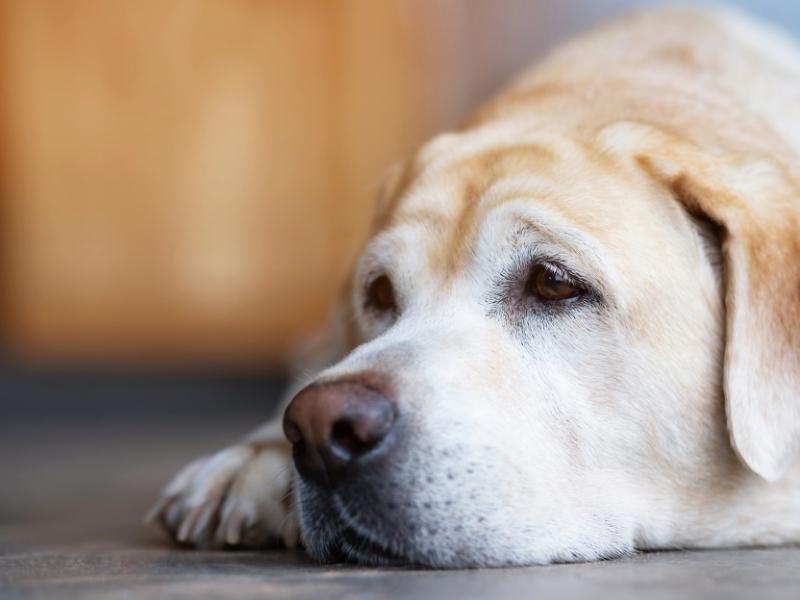Has your usually energetic and playful dog become withdrawn and lethargic? Is your dog seemingly uninterested in daily activities or sleeping more and eating less? If this is the case, you may wonder if my dog is depressed?
So, can dogs become depressed? Much like humans, dogs can suffer from depression and anxiety. Dogs experience similar symptoms of depression as people. A depressed dog may become inactive, withdrawn, eat less, or sleep more. If you notice any of these symptoms, take your dog to the vet, as they can point to a medical issue.
While dogs generally don’t experience clinical depression as humans do, they still feel sadness and grief. Keep reading to learn more about symptoms, treatment, and prevention of dog depression.
What Causes Depression in Dogs?
Significant changes in a dog’s life or environment lead to depression in dogs. If you think your dog suffers from depression, consider what has changed or is changing in the dog’s life.
Any big or small change to a dog’s regular routine can cause stress, anxiety, or depression. Listed below are the most common causes of depression in dogs:
- Moving to a new home
- Chronic pain
- Health problems
- Trauma from an injury or abuse
- Isolation
- Lack of physical and mental stimulation, particularly in highly energetic and working dogs
- Addition of a new family member, whether human or pet
- Loss of an owner
- Loss of a companion animal
- Change in the dog’s routine, like dog owner going back to work after extended leave or children going back to school after a break
The most common causes of severe depression in dogs are the loss of an owner or the loss of a companion animal.
A study in Sweden has found that dogs mirror the stress levels of their owners. So, if a family member or another pet has died, the dog can be responding to the reactions and grief of the people in the household.
A death in the family changes things, and your dog may feel like it isn’t getting the same amount of attention as before. This could lead to stress and depression.
Symptoms of Depression in Dogs

Dogs can exhibit symptoms of depression in many different ways, depending on the cause. A dog that has lost a companion pet will show different warning signs of depression than a dog experiencing changes in its normal routine.
The symptoms of depression in dogs are very similar to those in people and include:
- Loss of appetite
- Withdrawal from social situations
- Lethargy
- Sleeping more than usual
- Hiding
- Exhibiting clingy and needy behaviors
- Increased vocalization (barking, howling, and whining more)
- Unusually aggressive behavior towards people and animals
- Inappropriate elimination inside the house
- Destructive behavior
- Lack of interest in play and other activities
- Spending a lot of time in areas of the home where its companion spent a lot of time
To properly diagnose a potentially depressed dog, a veterinarian must get a complete medical history from the dog’s owner. Symptoms of dog depression are similar to other medical conditions, and your vet will need all the facts to make the proper diagnosis.
Being familiar with any changes in home and family dynamics will help your vet establish if depression is the cause of your dog’s clinical symptoms.
How Do You Treat a Dog with Depression?
Dogs are very resilient, and most bounce back from depression within a few days or a few months with just a little extra care and attention.
Experts recommend spending some extra time with a sad dog, taking it to longer walks, playing regularly, and having relaxing grooming sessions. You’d be surprised how a little time, extra attention, and fun activities can help your dog overcome depression without problems.
Also, don’t forget to reward your dog whenever it shows signs of happiness. If the only thing that gets your dog’s interest is a game of fetch, play fetch a few times each day, praising and rewarding your dog when it seems happier.
However, depression is a severe and long-term condition for some dogs. These dogs need more help and additional treatments to bounce back from depression. Dogs with severe depression usually had traumatic lives, coming from abusive homes or puppy mills.
A certified behavioral expert is often recommended for these dogs. In some cases, medication can also help these dogs overcome depression. Medication for depressed dogs is the same as for depressed people and includes Prozac, Zoloft, and Paxil.
Medication is used when nothing else works and if the dog can’t function properly. Or if depression interferes with the dog’s ability to learn new behaviors.
How to Prevent Depression in Dogs?
There are many things you can do to prevent depression in your dog. Keep your dog exercised and mentally stimulated to keep it happy. Here are some things that will help keep your dog healthy and content:
- Keep up with your dog’s regular routine
- Exercise and play with your dog every day
- Keep your dog mentally stimulated with training and puzzle toys
- Take your dog to regular veterinary check-ups
- If you work long hours, hire a pet sitter or enroll your dog in doggy daycare
- Consider getting another dog, so your pooch has company while you’re at work
Conclusion
Dogs can suffer from depression just like people. With extra care, attention, and love, most dogs overcome depression within a few days or several months.
If your dog is depressed, take it to more walks, have regular play sessions, and try to spend more time together. Reward and praise your pup whenever it seems happy, and do the things that make your dog more comfortable.
Related Articles:


0 Comments